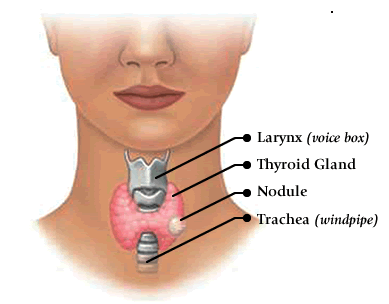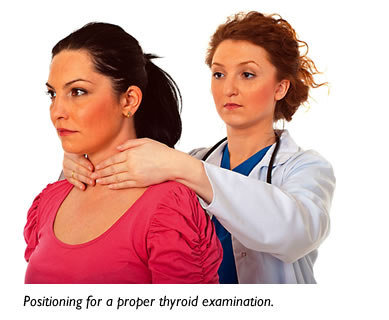|
Thyroid Gland and Surgery
The thyroid gland is one of the largest endocrine glands in our body. An endocrine gland is a structure that secretes (hormones) directly into the blood. The thyroid gland is located in the anterior neck. It secretes thyroid hormone that controls how quickly the body uses energy, makes proteins and controls how sensitive the body is to other hormones. The thyroid nodule is the most common endocrine problem in the United States. The chances are one in ten that you or someone you know will develop a thyroid nodule. The term thyroid nodule refers to any abnormal growth of thyroid cells into a lump within the thyroid. Ninety percent (90%) of thyroid nodules are non-cancerous. Ten percent (10%) of thyroid nodules do contain thyroid cancer. We do not know what causes most thyroid non-cancerous nodules to form. Cancerous nodules are more common in people who have a history of neck radiation exposure, a family history of thyroid cancer and are older than
40 years of age.
Once a nodule is discovered, blood work can determine how your thyroid gland is functioning—normally, too fast or too slow. Rarely is it possible to determine whether a thyroid nodule is cancerous by physical examination and blood tests alone. The evaluation of thyroid nodule often includes specialized tests such as a thyroid ultrasound, thyroid nuclear medicine scan, and thyroid fine needle biopsy. A fine needle biopsy is the process of using a very small needle and local anesthetic to biopsy the nodule. This biopsy is then reviewed by the pathologist. The results will show one of the following:
Often thyroid cancer is cured by surgery alone, especially if the cancer is small (<1 cm). If the cancer is large or has spread to adjacent lymph nodes, radioactive iodine can be used to destroy thyroid cancer cells that are left after surgical removal of the thyroid gland. Radioactive iodine works best when there is only a small amount of cancerous cells left in the body after surgery. It is a safe and well tolerated treatment.
Overall, the prognosis for thyroid cancer is very good. The prognosis is better in patients that are under 40, have tumors less than 1 cm, and have cancer confined to only the thyroid gland. The prognosis is poorer in older patients over 40 who have large tumors greater than 4 cm. However, most patients with thyroid cancer are able to live long, productive lives. The key to the surgical treatment of thyroid cancer is to find experienced surgeons who are comfortable with operating on the thyroid gland.
Dr. Richard Daniels – Evergreen Surgical |



 Your doctor may discover the nodule during a routine physical examination or you may notice a lump in your neck while looking in a mirror. Rarely do patients with thyroid cancer complain of neck pain, difficulty swallowing or shortness of breath.
Your doctor may discover the nodule during a routine physical examination or you may notice a lump in your neck while looking in a mirror. Rarely do patients with thyroid cancer complain of neck pain, difficulty swallowing or shortness of breath. After surgery, patients need to be on thyroid hormone for the rest of their life. This consists of taking medication to keep blood levels of thyroid stimulating hormone (TSH) in the normal range. Follow-up examinations are important for all patients because thyroid cancer can return. This follow-up may include some of the following: history and physical examination, blood work (thyroglobulin level check—can serve as a cancer marker), ultrasounds of the neck and whole-body iodine scans.
After surgery, patients need to be on thyroid hormone for the rest of their life. This consists of taking medication to keep blood levels of thyroid stimulating hormone (TSH) in the normal range. Follow-up examinations are important for all patients because thyroid cancer can return. This follow-up may include some of the following: history and physical examination, blood work (thyroglobulin level check—can serve as a cancer marker), ultrasounds of the neck and whole-body iodine scans.